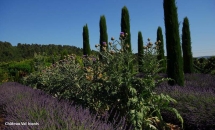For most of the inhabitants of the different countries, Mediterranean landscapes are the setting in which every day events took place, take place and will take place in the future. We live surrounded by Mediterranean landscapes. We exist within this Mediterranean setting, very often, without knowing much at all about the state it is in, its limits, its problems, how we have treated it and what future problems it faces. All too often, man has treated his natural environment as if he had no connection with it, no interdependence and no obligation.
In this lecture I would like to focus on the basic knowledge represented by our landscapes and the problems they hold. In order to be able to manage our landscapes, in the present and future, we must understand their characteristics, their functions and dynamics. I will be analysing the physical environment of Mediterranean landscapes as an important factor which determines their functionality, dynamics and geographical distribution, as well as the importance of biodiversity as a valuable element to be preserved; one that is fundamental in the Mediterranean world.
Finally, it is important to look back to the past to seek the origin and understand the dynamics of the great climatic and bio-geographical crises that have taken place throughout history. However, in order to gain a complete view, we should analyse the role that man has played and the actions he has carried out on the landscape over the past 3,000 years. Today's Mediterranean landscapes cannot be explained without considering the historical role of man. Ever since the times of the Phoenicians, followed by the Greeks, the Romans, the Arabs, the discovery of America and leading up to present times, man has introduced a multitude of plant species (approximately 25% of our flora) associated with crop growing and gardens. Man's role has been very complex and important, and that is why we need to analyse both the use that has been made of the vegetation, as well as man's role as the introducer of species and plant crops from other territories.
Cycle: Gardens in the Mediterranean: identities and idealised spaces
Organized by: Residence for Researches
